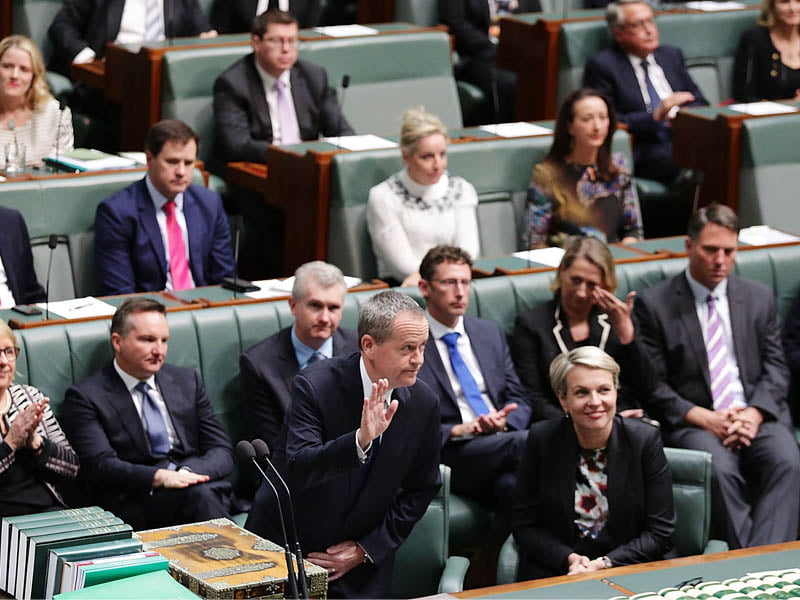If Bill Shorten didn’t already know what it feels like to get gazumped, he certainly does now. The Federal Government has moved in the past two weeks from having no interest in the technology sector, to having nothing but interest in the technology sector.
Talk about a digital transformation!
And so the Leader of the Opposition, who had been enjoying a 2015 in which he had been driving new policy ideas for the sector, has suddenly had the wind taken from his sails.

All of a sudden, the Australian Government is all about technology, all about digital transformation, and all about the “new” economy. And this, of course, is a good thing.
The reality is, and this is where it must be frustrating for Bill Shorten’s team, is that the new Prime Minister has not actually announced any new policies. All he had to do to turn the ship of state in a new direction was to talk a new language, using 21st century words like ‘agile’, ‘innovative’ and ‘creative.’
And so, when Labor announced late last week a raft of policy initiatives aimed at startups and entrepreneurs and educators, people’s attention was already turned elsewhere. Those with an interest in this space are too keen to hear what the actual government has planned, rather what the opposition is thinking.
It’s unfair, because a lot of work by smart people has gone into the framework that Labor has put in place during 2015 (starting with Shorten’s Budget Reply speech in May.) And quite likely, versions of Labor’s thinking will end up in Turnbull Government policy.
Because some of it is no-brainer stuff that had been shockingly absent from the Abbott agenda. Seriously, Bill Shorten must be sick as a dog over this.
Here is a short summary of Labor announcements. Labor had already announced in May plans for 100,000 new funded STEM places at universities, as well as incentives to encourage 25,000 new STEM teachers in primary and secondary schools. It was extremely well received.
It also announced in May a $500 million fund for startups, which left many scratching their heads (but at least acknowledged a funding problem.)
Last week, Labor added significantly to its policy thinking, particularly around entrepreneur visas. First, it would grant up to 2,000 entrepreneur visas to attract the best and brightest from around the work a utopian startup hub in Australia (this kind of scheme has worked well elsewhere, like Singapore and the UK.)
Secondly, it would fund an “honours year” for our smartest kids – 2,000 of them – the ones with ideas and some entrepreneurial ambition. The extra year would allow them to focus on business mentoring.
And finally, Labor wants to offer a further 2,000 visas to the smartest and most entrepreneurial foreign students. The argument here is that these smart foreign kids have come here for an education – so why not try to keep the best of them here and let them start a company.
These are ideas that will almost certainly get picked up – more or less – by the incoming team under Malcolm Turnbull. So better that Labor got them out early.
There are interesting dynamics at work in Australian politics right now. The politics of oppositionism has peaked. There are clearly signs of a constructive consensus.
Both the Shadow communications spokesman Jason Clare and parliamentary secretary to the shadow treasurer Ed Husic (and indeed the shadow treasurer Chris Bowen) have said they will work with the new government on fundamental digital transformation stuff.
Of course there will be issues where they will die in a ditch (education reform would be one). But the no-brainer stuff that Abbott left alone should attract a more cooperative form of politics.
Jason Clare has had a good working relationship with Malcolm Turnbull’s office. Think the Australia Post changes, or the crowd-sourced funding legislation. This should continue, and that is very good news for the ‘reform’.
Certainly it should be expected that Labor and Turnbull will find common ground in the digital transformation issues in government. This will happen, assuming there is a consultative rather than combative strategic path taken.
Here’s the thing about the so-called “narrative” of the new leadership. We have only just scratched the surface of the tech-based changes that this government will bring to the table.
Despite the fact that it is impossible to turn on Radio National in the mornings these days without hearing someone talking about innovation, we’ve not really heard anything yet.
With great respect, the mainstream media is still not registering just how central ‘digital’ thinking will be to this government’s agenda.
When we talk in terms of being ‘agile’ and ‘innovative’ and ‘creative’, we are talking about very large concepts that impact everything (not always in a positive way, but certainly trending that way.)
It is not possible – surely we understand this – to have a national conversation about digital ‘disruption’ issues, for example, without also talking about workplace relations. Or tax. Or trade. Or visas. Or education. Or any one of a hundred other issues.
No-one wants to scare the horses, but when Malcolm Turnbull talks about embracing change, that is exactly what he means.
Everything is on the table again.
Do you know more? Contact James Riley via Email.

